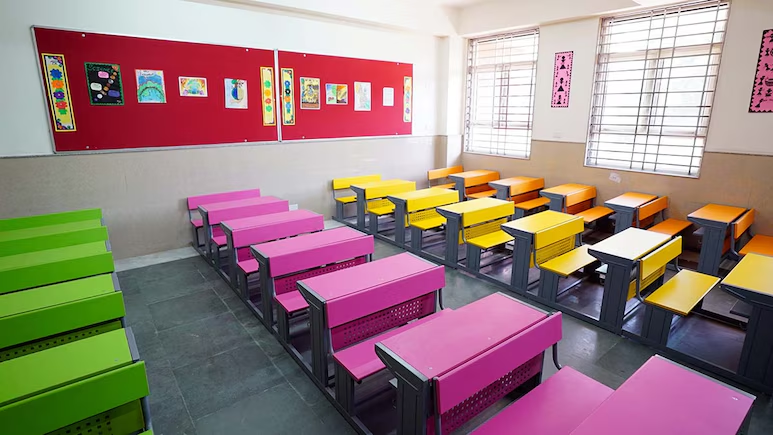
The Union Minister of Education, Ramesh Pokhriyal ‘Nishank', answered questions on the new National Education Policy on his Twitter page today. The Education Minister explained what the new structure of the school curriculum means, what will happen to the board exams, what consultations had been undertaken by the ministry before finalising the policy and what changes in curriculum might be expected. The day-long exchange with Mr Ramesh Pokhriyal was aimed at clearing students' doubts about the NEP 2020, cleared by the Union Cabinet on July 29. Before this, the Education Ministry held a fortnight long series of webinars on the new policy. Students have been asking questions online, tagging their posts with #NEPTransformingIndia hashtag on Twitter.
Several questions were asked relating to NCERT curriculum, vocational learning, SWAYAM Prabha and installation of libraries as part of the NEP 2020.
NEP 2020 And NCERT Curriculum
Students concerned about changes in NCERT curriculum after the implementation of the National Education Policy asked Mr Pokhriyal if they will still have the Class 10 and Class 12 board exams.
National Curriculum Framework prepared by the #NCERT will clearly define the modalities, keeping in view the #NEP recommendations that Board exams be redesigned to encourage holistic development. #NEPTransformingIndia https://t.co/ywYLjJXAy9
— Dr. Ramesh Pokhriyal Nishank (@DrRPNishank) October 1, 2020
Another student asked: “Can students of class-11th 2020-2021 batch take multi subjects in Commerce like History or Civics in commerce?”
The National Curriculum Framework for School Education being prepared by the @ncert will clearly define these modalities. The #NCFSE is expected by the end of 2021.#NEPTransformingIndia https://t.co/jPLkZAYNXg
— Dr. Ramesh Pokhriyal Nishank (@DrRPNishank) October 1, 2020
A student asked the minister to explain the 5+3+3+4 structure as provided in the new NEP 2020.
The National Curriculum for school education, which will come in 2021, will clearly define the 5+3+3+4 structure proposed in #NEP in detail. In this new structure, pre-school (age 3 to 6) will become an integral part of school education. #NEPTransformingIndia https://t.co/4jb3Waasye
— Dr. Ramesh Pokhriyal Nishank (@DrRPNishank) October 1, 2020
National Education Policy 2020 And Higher Education
Uncertain about the implementation of NEP 2020 in both public and private universities, a student asked the Education Minister: “Will NEP 2020 be applicable for private institutions?”
The #NEP2020 envisages transforming the entire Higher #Education System of India, which includes Public as well as Private Institutions. #NEPTransformingIndia https://t.co/D2EpZ6ti8X
— Dr. Ramesh Pokhriyal Nishank (@DrRPNishank) October 1, 2020
Another student asked Mr Pokhriyal on his Twitter handle: “When will the new guidelines take effect of dual degree admission?”
Multidisciplinary and holistic education will be introduced in a phased manner by assessing the preparedness of the select institutions to start with.#NEPTransformingIndia https://t.co/gJjytH1OFo
— Dr. Ramesh Pokhriyal Nishank (@DrRPNishank) October 1, 2020
NEP 2020 And Early Childhood Care
The Education Ministry earlier in September held several webinars to take the new education policy forward, all collectively titled “Shikshak Parv”. One such webinar was conducted on Early Childhood Care and Education. Through Thursday's question-answer round, a student asked Mr Pokhriyal: “I would like to know the impact if NEP on existing standalone Play schools. As we understand this was an unorganised sector run privately. Will these be regularised( being part of 5+3+3+4). Lot needs to be clarified for play Schooling.
Early Childhood Care and Education (age 3 to 6) will be an integral part of School Education under #NEP2020. #NEPTransformingIndia https://t.co/TDD9tkIgY4
— Dr. Ramesh Pokhriyal Nishank (@DrRPNishank) October 1, 2020
NEPTransformingIndia
Another Twitter user asked what the policy has to say about establishing libraries.
As envisaged in #NEP, public and school libraries will be significantly expanded to build a reading culture across the country. #NEPTransformingIndia https://t.co/XCzvhHtcdq
— Dr. Ramesh Pokhriyal Nishank (@DrRPNishank) October 1, 2020
Appreciating NEP 2020, another one asked: “With many schools lacking access to IT infra, how can we get educators and students the right devices for content creation?”
Existing e-learning platforms like @SWAYAMMHRD, #DIKSHA, will be extended to provide teachers with a structured, user-friendly, rich set of assistive tools to monitor the progress of learners, & tools, such as two-way video & audio interface for holding #online classes. #NEP2020 https://t.co/oDT1LuDJqN
— Dr. Ramesh Pokhriyal Nishank (@DrRPNishank) October 1, 2020
NEP 2020 And Vocational Learning
A student concerned about the basis of Diploma in Engineering (Polytechnic Entrance exam) after matriculation examination asked: “Diploma in Engineering (Polytechnic Entrance exam)is based on matriculation examination after NEP What will be its basis?”
#NEP envisages the integration of vocational education in the entire education sector. It also speaks about secondary schools collaborating with ITIs, polytechnics, local industry, etc. #NEPTransformingIndia https://t.co/PAvFYq3tMR
— Dr. Ramesh Pokhriyal Nishank (@DrRPNishank) October 1, 2020
